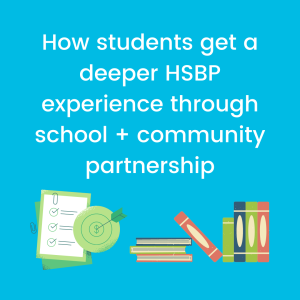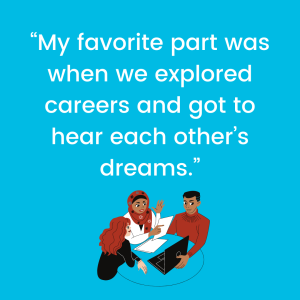
The High School and Beyond Plan process is a graduation requirement that supports students in exploring their interests, planning high school coursework that is aligned to those interests, keeping track of major assessment scores, and logging work and other relevant experience. The Plan is designed to enable students to successfully pursue education or training after they graduate high school.
For students who come from immigrant or refugee backgrounds, navigating the many steps of the Planning process and working toward a post-high school credential can be an extra challenge because of language barriers, unfamiliarity with U.S. education, and other hurdles. Moving more slowly and getting more guidance is often needed, but schools don’t always have the resources to make this happen.
“It’s a structural inequity in our system,” said Rachel Kurz, the Youth and Education Program Manager for the International Rescue Committee (IRC).
That’s where the IRC has stepped up in five Puget Sound districts to support students with efforts to slow down the Planning process and add more time and resources to reflect, learn, and explore. A new four-week summer internship, Youth Futures, launched in 2021 in Federal Way to create space for students to investigate four themes: leadership, college exploration, career exploration, and job readiness.
The results of the pilot effort were positive – 27 students participated, and in surveys following the end of the internship, they reported increases in confidence, as well as knowledge about college options and how to pay for it.
“My favorite part was when we explored careers and got to hear each other’s dreams,” one student wrote in the survey.
The internship was offered at two different times of day to accommodate schedules of students who were working or taking summer school classes. Students also received stipends, which made attendance easier.
The virtual meetings each week offered a mix of information sharing, interactive activities and games, and time to reflect. Students learned about possible career paths and the skills those paths require; postsecondary education opportunities, including degree, apprenticeship, and certificate programs; and more information about how pay for college.
Moving at the pace of the students contributed to the success of the internship, including taking time at the beginning to ensure students understood the Planning process and what they were working toward.
“Building meaning at the beginning is so important,” said Larissa Siregar, IRC’s Youth Program Coordinator for Secondary Programs. “Slow things down, understand what students want to explore, and let them lead the conversation where it needs to go for them.”
Program designers also intentionally linked to existing resources from the school district and state agencies.
“It’s wonderful to see what students connect to,” Siregar said. “We’re hoping to tie into what students are hearing already at school, as opposed to building something new.”

The Youth Futures summer internship is one of many collaborations that IRC runs with its partner districts. IRC programs support students and young people ages 18-24 who are new to the United States with academic, social and emotional, and college and career readiness needs.
The IRC intentionally integrates High School and Beyond Planning efforts into other aspects of its programming, as well. At the middle school level, supportive programming helps students build foundational skills in math, as well as social emotional learning, goal setting, and time management. At the high school level, programming in the past year has focused specifically on the Plan and helping juniors and seniors successfully graduate high school with a plan for their next steps.
When partnerships grow between schools and community-based organization, students and families reap the benefits, Kurz and Siregar said. The IRC is careful to understand districts’ goals and help fulfill them.
Community organizations like IRC often have deep, trusted relationships within communities and can act as a bridge between families and schools. Such organizations also can bring more flexibility to programming. For example, IRC staff know the best times of day to reach families – often in the evening – and they can staff efforts accordingly to get in touch with families to recruit for programming like the Youth Futures internship. IRC also knows families’ preferred languages and can offer interpretation.
As districts in the Puget Sound region have recognized the value of collaborating with IRC over the last few years, its programming has more than doubled, Kurz said.
The next steps for Youth Futures, which IRC will make a regular part of its offerings, is to connect with other districts and continue to build relationships with college and career departments.
As for the experiences of students last summer, the post-internship survey indicated connecting with other students and learning about future options were highlights.
“All of what we learned was my favorite part of the internship,” one student wrote.
Another said, “Getting to know new people was my favorite part. Leaving the new people I have just met is the hardest.”